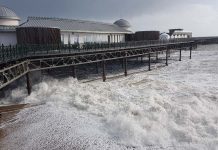I arrived at Kings College Hospital in London and was shown around the Derek Mitchell ward which would be my new home for the duration of the transplant. It was basically a long corridor with 7 or so rooms on either side. Each door had a glass window which was striped with partially frosted lines. I peered through the window of a few of the rooms. Each room had a person in, each person was bald and I remember finding it difficult to determine their gender at a glance. All residents were different ages, some elderly, some adolescent and some were children. It was a bit like a scene out of the Matrix and felt a little eerie. At the end of the corridor was the recreation room with a sofa and a TV with a PlayStation attached to it. The doctor told me there was a kitchen which prepared the food for the patients and would accommodate our requests and would make any meal we fancied, within reason. I was taken to a meeting room where we discussed my stay and that I was here to have a bone marrow transplant. I was handed a handful of leaflets which explained the procedure and a consent form with a space at the bottom for my signature. The form said the procedure was not guaranteed to work and that complications could arise that would ultimately lead to my death. I asked the doctor to be frank and to tell me what chance I had of surviving, he said I definitely had chance. I asked for a percentage figure, he said about 20%. There were no other options for me, so of course, I signed the form. I was led to a room with one of those frosted windows and made myself comfortable. The room had a big air duct in the roof and one above the door. The treatment would lead to me being susceptible to bugs and unable to fight infections without support. The air ducts had micro-filters in to filter out the bacteria that could lead to those infections. There was a bathroom, with a sink and shower which had a seat and lots of handles. The doctors said that I would not be allowed to leave the room during the process and that I would be in the room for 3 or 4 weeks.
The next day I was taken down to the theatre to have the Groshong line removed and have it replaced with a new line called a Hickman. The chemotherapy continued only this time it felt a bit stronger. I was sick for longer and needed more anti-sickness drugs. Along with the chemotherapy came the next phase of my treatment, a course of total body irradiation therapy. About a week before the radiotherapy was to begin I was advised to cover my whole body with moisturising cream and keep it moisturised. This would prepare my skin for what was to come. The radiation therapy was necessary to kill off any cancer cells that the chemotherapy had missed. I was moved over to Guys Hospital where each day I was popped onto a trolley and taken to a room with a big white machine built into the wall. Once there I was sat in an upright position with legs pulled in and my body packed out with large sacks of Vaseline or gel. This was to make me more of a ‘block’ which made the radiotherapy more effective. A lead shield was placed up against my head, between me and the machine on the opposite side of the room. Once I had been prepared the doctors aligned the trolley with lasers that came from the ceiling somewhere. I was asked if I wanted to have some music on whilst being zapped, I always chose the Bob Marley’s Greatest Hits CD as it filled the big empty room with some nice relaxing vibes. The doctors would then leave the room. There would then be a slight buzzing sound for around 5 or 6 minutes and the doctors would return, remove the gel sacks and I would be wheeled back upstairs. This was repeated for 7 days, twice a day. There are no immediate side effects from having the radiotherapy but the side effects would come. This is why I had to put all that cream on a couple of weeks before hand as around 10 days after the treatment I had the effects of sunburn. My skin was red like I had been out sunbathing but was so very moisturised and soft. This side effect lasted a week and just like sunburn, eventually disappeared with no lasting effects. By this time, I was feeling the full force of the treatment.
I remember lying in the room and trying to sleep but couldn’t because my mouth was constantly watering. The chemo was poisoning me and I wanted to be sick but the anti-sickness drugs were preventing it. I had to lie on my side with a bundle of tissue near my mouth so the water could be soaked up. Otherwise it was impossible to sleep. I was also in nappies by this point having slightly lost control of some other systems. As the chemo continued to kill off my bone marrow the cells in my mouth slowly died out and stopped being replenished. These cells (taste buds etc.) have a short life span and only last a couple of days. Without these cells being replaced by the bone marrow, the inside of the mouth and the tongue start to blister and crack which is quite painful. The medicine for this is in-house medical cocaine mouthwash. The hospital produces this solution the sole purpose of which is to numb the mouth. I could only have it every 4 hours but it did a great job of numbing not only my mouth but most of my head. It’s at this point that I wasn’t eating very much at all and had lost over 10% of my bodyweight. This is the time when the doctors have to make a decision on how to get calories into your body. It wasn’t a decision that was taken lightly by the bone marrow transplant team however, the days of me eating orally had come to an end and it was time to be fed by a drip. A big red bag, of what looked like milk, would be attached to a machine and that machine to a line in my chest. It contained all the minerals, nutrients and calories you need in a day. I also had a permanent morphine syringe connected up which automatically administered morphine. The syringe was placed into a dispenser which would compress ever so slightly every 10 minutes or so. By this time, I had a lot of machines connected to me all doing different things. There were three machines connected to the line in my chest, one delivering antibiotics, needed to stop infection. One delivering the final course of chemo. One delivering the food and calories I needed and the morphine drip stuck in my backside. It was very impressive.












